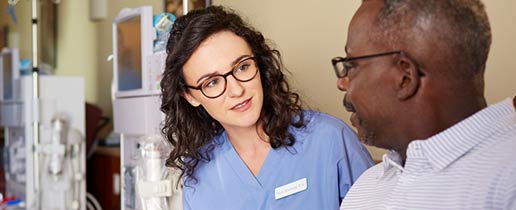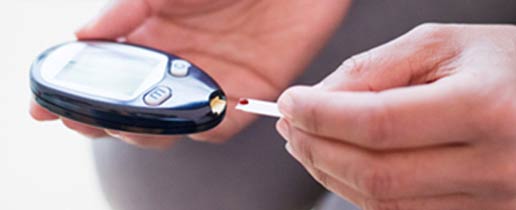Acute Kidney Injury Treatment and Recovery

Acute kidney injury means your kidneys stop working suddenly. AKI requires immediate treatment and may be reversible if diagnosed and treated quickly—unlike chronic kidney disease (CKD), which is kidney damage that typically progresses slowly over a period of time and is not reversible. Some people diagnosed with AKI will need temporary dialysis until normal kidney function returns.
Treating acute kidney injury with dialysis
If you have AKI that requires dialysis, also referred to as AKI-D, you may be treated in the hospital—since many people with AKI are in the hospital already for an injury, illness, or other condition—or at a dialysis center, under the care of a nephrologist (kidney doctor). Each person's recovery is different, and the length of time you receive acute kidney injury dialysis will depend on how long it takes for your kidneys to recover.
What should I expect with dialysis for AKI?
Dialysis works by filtering toxins, waste, and fluid from your blood through a dialyzer inside a dialysis machine. Your blood is accessed through your catheter site and circulated through the machine and cleaned before being returned to your body. Your access site allows blood to safely leave your body, travel to the artificial kidney or dialyzer and safely return to your body. A dialysate solution is used in the filtering process to remove unwanted substances from your bloodstream. During your dialysis treatment your care team will be monitoring you closely.Before and after treatment, your weight and blood pressure will be taken. These measurements help your care team understand how much excess fluid you may have. As a result, your care team may make adjustments to your fluid intake recommendation.
Weekly laboratory tests may be used to check your kidney function. These tests will help your doctor and care team adjust your treatment and monitor the progress of your recovery.

Keeping your catheter site clean and protected is very important while you’re on dialysis for AKI. Taking care of your catheter can help reduce infection and keep you your healthiest.
Medications to avoid or adjust with AKI
- NSAIDs—nonsteroidal anti-inflammatory drugs (NSAIDs) are common pain relievers that can be harmful to damaged kidneys.
NSAIDs include: ibuprofen and naproxen, among others. - ACE inhibitors—angiotensin converting enzyme (ACE) inhibitors are commonly taken for high blood pressure.
Common ACE inhibitors that may pose a risk include: benazepri/, captopril, enalapril, lisinopril, and ramipril. - ARBs—angiotensin II receptor blockers (ARBs) are commonly taken for high blood pressure.
Common ARBs that may pose a risk include: valsartan, candesartan, irbesartan, losartan, and telmisartan. - Antibiotics—certain antibiotics should not be taken by people with AKI.
Antibiotics to avoid with AKI include: Bactrim, aminoglycosides (given intravenously), such as gentamicin and tobramycin. - Diabetes medications—many diabetes medications may need to be avoided or adjusted if you have AKI. Check with your doctor about any diabetes medications you are prescribed. Your doctor will work with you to closely monitor blood glucose levels.
Diabetes medications to avoid with AKI include: metformin, canagliflozin, dapagliflozin, empagliflozin, exenatide, and victoza. - MRI or CT scan contrasting agents—the agents typically used to show contrast in CT scans or MRI scans should be avoided with AKI. Talk to your doctor if you need one of these tests for another condition or injury. There may be alternative scanning methods to consider.
Contrast agents to avoid: iodinated contrast agents for CT scans and gadolinium contrast agents for MRI scans.
Talk to your doctor about your current medications
Talk to your doctor immediately about any medications, vitamins, or supplements you’re taking. When your kidneys are injured, many medications require close adjustment because they’re cleared through your kidneys and could cause additional harm. Ask questions and make sure you understand any new medication instructions.
What are the signs of AKI recovery?
It’s important to recognize signs of potential AKI recovery so you can notify your doctor immediately if you start to see improvement. With AKI, kidney function may be regained if proper AKI treatment is received quickly.
Signs of AKI recovery to watch for:
- Increases in urine output—urine output is a key indicator of kidney health. While too little or no urine output is a sign of kidney injury or kidney damage, an increase in urine output after AKI or AKF can be a sign that your kidneys are recovering. If you notice an increase in the amount of urine you’re making, talk to your care team. It may help to use a urination tracker to keep up with how many times you’re urinating throughout the day, so you can compare output from day to day and over time to see if your kidney function is improving.
- Changes in swelling or fluid retention—retaining or releasing fluid can be indicators of kidney health. Monitoring your fluid retention and your weight, and reporting any changes to your care team, is important to tracking fluid levels.
- Decrease in serum creatinine levels—your doctor will monitor your serum creatinine through laboratory tests. If your levels are decreasing, this can be a sign of recovery.
What can I expect after AKI recovery?
People who’ve experienced acute kidney injury or acute renal failure have a greater risk of developing health issues in the future, including CKD, kidney failure, stroke, or heart disease. It’s important to continue seeing a nephrologist for ongoing care—even after you recover from AKI. Receiving early treatment for any future complications can help you protect your health and feel your best.

